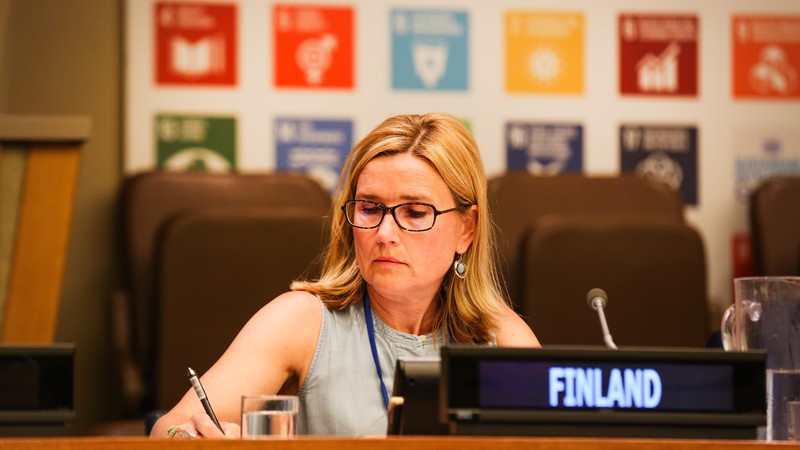
© Natalie Mroz
Interview with Annika Lindblom, among other position leader of the department of the environment in Finnland on the implementation of the Agenda 2030 in her country
By SDG WATCH Austria
SDG Watch Austria spoke with Annika Lindblom, Secretary General of Finland’s National Commission on Sustainable Development and Counsellor for International Affairs and Deputy Head of Unit of the Ministry of the Environment in Finland, about the implementation of the SDGs in her country. We asked her about the main challenges as well as factors for success regarding the implementation of the Agenda 2030 in her country. Read her answer here:
Finland’s approach to a successful implementation
Finland has a long tradition of promoting sustainable development in Government policies and in societal discourse. The National multi-stakeholder Commission on Sustainable Development was established already in 1993, and it has since then operated without interruption. 10 different governments and 7 Prime Ministers from different political parties have led the work of the Commission, including around 40 non-governmental members. The Prime Minister’s office coordinates the work with the help of sectoral SD Focal Points from all line Ministries. Political priorities and emerging issues may have changed but the overall objective to integrate sustainable development into national policies, measures and practices has stayed alive through 25 years.
This long-term, high-level and, to a large extend, institutionalized work for sustainable development has been the main success factor for keeping sustainable development high on the political and societal agenda in Finland. It also helped Finland to turn into an implementation mode quite soon after the adoption of the 2030 Agenda in 2015.
Making the 2030 Agenda everybody’s agenda
Another success factor has been the innovative mindset and approach in the administration in creating tools and measures to make the 2030 Agenda everybody’s agenda, leaving no-one behind. In addition to the National Commission on Sustainable Development, a multi-disciplinary Expert Panel of eight professors and a Youth Agenda2030 Group of 20 young sustainable development agents have challenged the Government and contributed to the work of the National Commission. The most recent tool to boost concrete action and innovations for sustainable development is called “Society’s Commitment to Sustainable Development”. It outlines a long-term sustainable development policy framework for the Finnish society up until 2050, but also provides an implementation tool for anyone in Finland who wants to participate in the implementation of the 2030 Agenda with concrete action. By now, there are over one thousand commitments from all spheres of the society. Private companies and schools have been the most active partners.
Governmental responsibility as key to engagement
The societal engagement is possible as long as the Government and the public administration show leadership and take overall responsibility of the implementation measures. The Government of Finland adopted a National Implementation Plan for the 2030 Agenda in February 2017. The Government has also included SDG consideration in its Annual Report to the Parliament and mainstreamed sustainable development in state budget planning. With the lead of the Ministry of Finance, a proposal for the 2019 State Budget with a comprehensive consideration of sustainable development was given to the Parliament in September 2018. This is a very important step in mainstreaming sustainable development into all sectoral policies and financial resources.
Meeting expectations is the biggest challenge
Now, when the governance structure, policy tools and participatory mechanisms for sustainable development have been put in place, the expectations for results and impact are high. The biggest challenges hence lay on meeting the expectations: how to ensure that this model delivers policies and measures that contribute to transformative change to socially, economically and environmentally more sustainable Finland? And how to ensure the high-level long-term interest and commitment for sustainable development over the Government terms?
Future steps: evaluating and learning from the results
To assess the efficacy of the Finnish sustainable development governance model and the achievements of national implementation of the 2030 Agenda, the Prime Minister’s Office launched an external sustainable development evaluation process in autumn 2018. The results of the evaluation will be published in February 2019 to guide the discussions around the national parliamentary election in April and ensure that the new Government has evidence-based and timely information on the strengths and weaknesses of sustainable development in Finland. Evaluation will also provide comprehensive data and analysis to Finland’s next Voluntary National Review on the implementation of the 2030 Agenda to be submitted to the United Nations’ High-level Political Forum HLPF in July 2020.
PICTURE: United Nations photo service/Natalia Mroz
-
FfD4 2025: Die Konferenz, die die Zukunft der globalen Entwicklungs-finanzierung entscheidet
April 29, 2025
-
May 28, 2024

-
Global Citizenship: Schüler:innen Austausch für eine friedlichere Welt
April 22, 2024
-
#PEOPLE: Jugend ist nicht bloß Zukunft, sondern Gegenwart!
June 21, 2023
